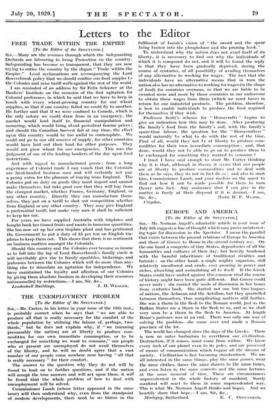THE UNEMPLOYMENT PRO3LEM
[To the Editor of the SPECTATOR.]
SIR,—Mr. Carter, in his letter in your issue of the 13th inst., is probably correct when he says that " we are able to produce all that is really necessary for the comfort of the whole population by utilizing the labour of, perhaps, two- thirds," but he does not explain why, if " we (meaning presumably the nation) are at liberty to produce com- modities for our own immediate consumption, or to be exchanged for something we want to consume," our people who at present are unemployed do not avail themselves of the liberty, and he will no doubt agree that a vast number of our people come nowhere near having " all that is really necessary " for their comfort.
The answer to the question why they do not will be found to lead on to further questions, and if the nation will accept the true answers and will act upon them, it will be found that the whole problem of how to deal with unemployment will be solved.
Commissioner Lamb (whose letter appeared in the same issue) will then understand why, even from the standpoint of modern developments, there need be no hiatus in the fulfilment of Isaiah's vision of " the sword and the spear being beaten into the ploughshare and the pruning hook."
To understand why the nation does not avail itself of its liberty, it is necessary to find out why the individuals of which it is composed do not, and it will be found the reply is that they have been gradually deprived, during the course of centuries, of all possibility of availing themselves of any alternative to working for wages. The fact that the individuals have no alternative means that in turn the nation also has no alternative to working for wages (in the shape of food) for countries overseas, so that we are liable to be sweated more and more by those countries in our endeavour to obtain those wages from them (which we must have) in return for our industrial products. The problem, therefore, is how to enable individuals to produce the food required for themselves if they wish.
Professor Scott's scheme for " Homecrafts " begins to give an indication how this may be done. After producing the family's food from the family's soil, with the family's spare-time labour, the question for the " Homecrafters " would naturally be what to do with the rest of the time. First of all, would they not be at liberty to produce com- modities for their own immediate consumption ; and, that done, would they not Le able to go on to produce them to be exchanged for something they wanted to consume ?
I trust I have said enough to start Mr. Carter thinking why it is that, although in theory it Kerns that our people are at liberty to produce commoditieg and to deal with them as he says, they do not in fact do SO ; and also to start him, Commissioner Lamb, and your readers on the quest to find out how it can be made possible for them to turn theory into fact. Any assistance that I can give in the matter is freely at their disposal if it is desired.—I am,
















































 Previous page
Previous page